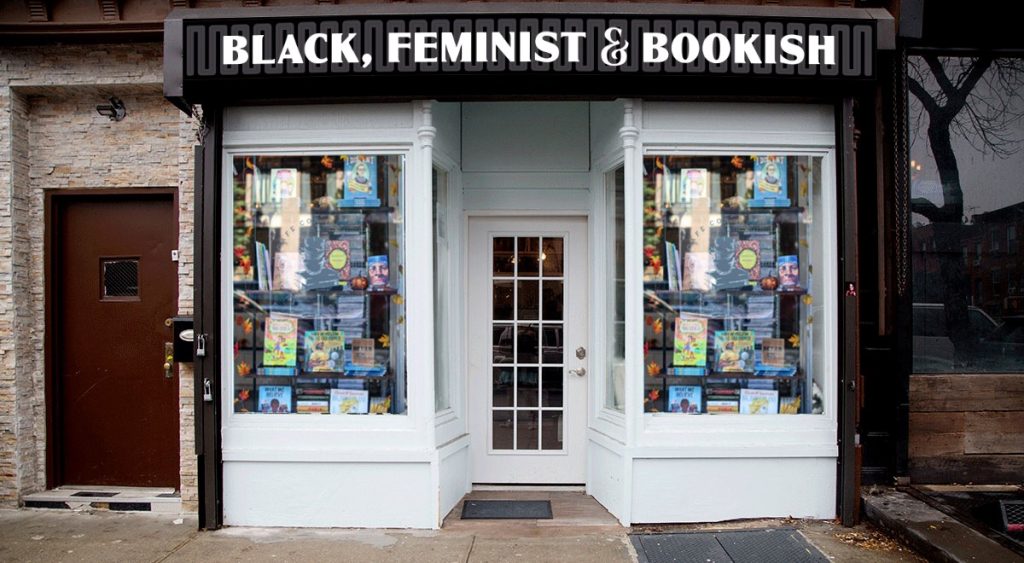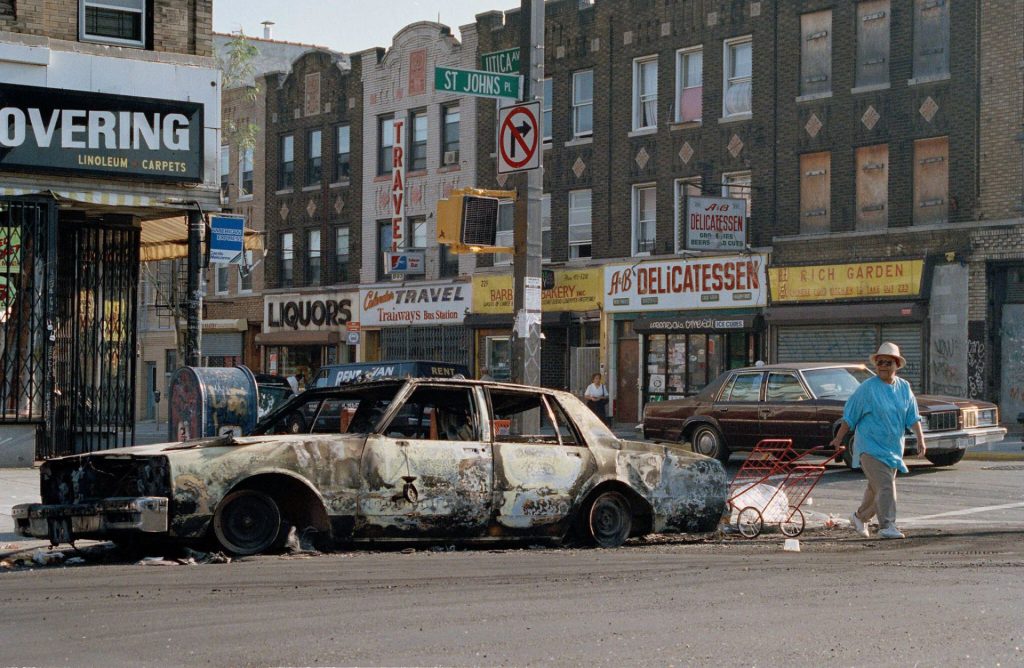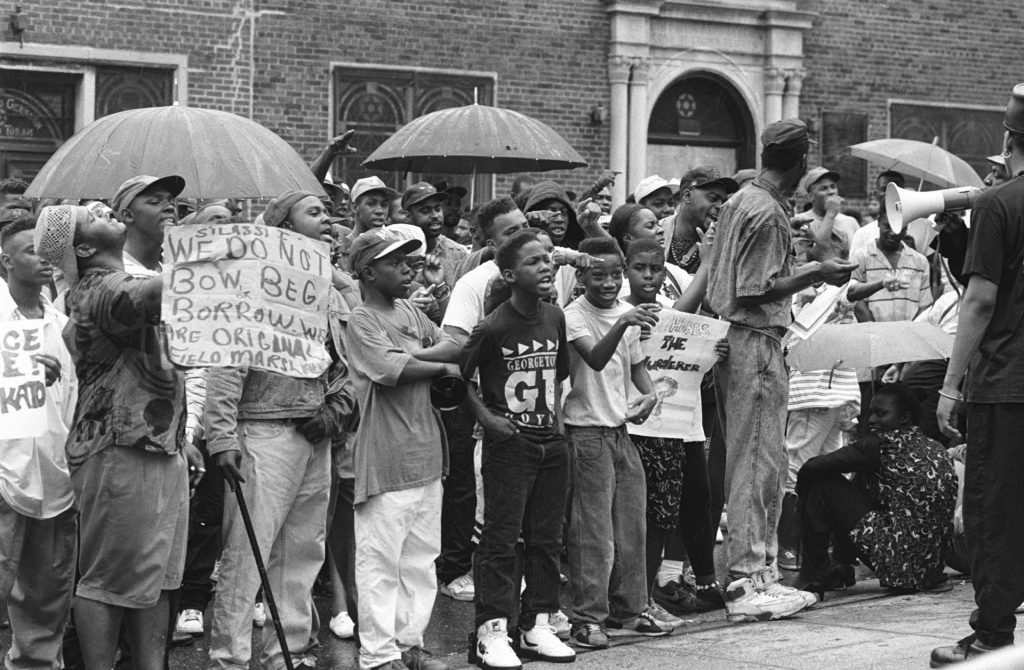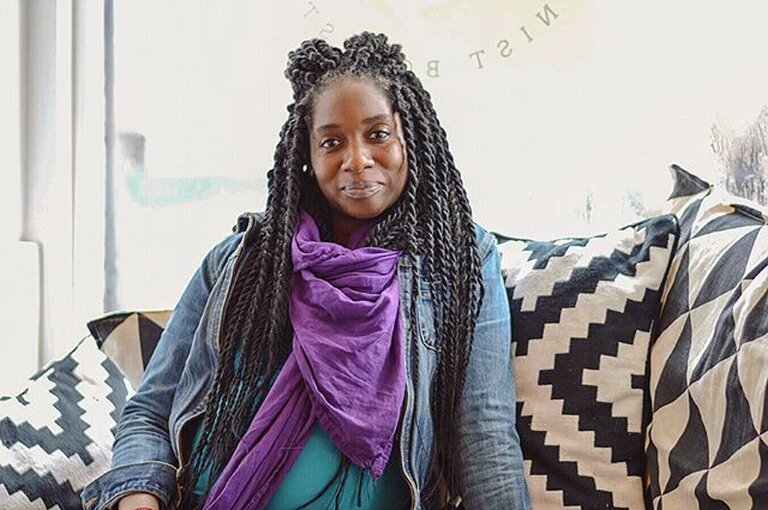Café con Libros: A Light in the History of Riots and Gentrification

Having grown up in the Crown Heights area, the owner of Café con Libros, Kalima DeSuze is acutely aware of the struggles the area has gone through and is still facing today. Since the bookstore’s opening in December of 2017, Café con Libros’ mission has been to unite the community of Crown Heights and to give the Black community a place where they can feel safe, make connections, and thrive. So, to understand the history of Café con Libros, we must familiarize ourselves with the history of the Crown Heights community.
On August 19, 1991, two African American cousins, Gavin and Angela Cato, were riding their bikes at the intersection of Utica Avenue and President Street—less than two miles away from where Café con Libros currently stands—when Orthodox Jewish Driver, Yosefl Lifsch, swerved onto the sidewalk. Gavin was killed and Angel survived, though she was severely injured. Rumors were spread that Lifsch was drunk driving, but they were later debunked, and the swerve was believed to have been deliberate.

A few hours later, a group of Black youths stabbed Yankel Rosenbaum, a visiting Orthodox Jew. Rosenbaum had nothing to do with the death of Gavin Cato, but the stabbing was seen as a retaliation to it. Though he initially survived the stabbing, Rosenbaum died from bleeding in an undetected wound.
Riots lasted anywhere from three to five days according to different sources. Homes, businesses, and vehicles were destroyed. Even before the riots, there was harboring resentment between the Black and Jewish communities in Crown Heights, because the Black residents believed that the Jewish residents had received special protection from law enforcement due to a police redistricting decision in 1976.

Not only has the Crown Heights community suffered from the festering grudges between the Black and Jewish residents, but it has also been dealing with vast amounts of gentrification. The New York Times article, “Gentrification in a Brooklyn Neighborhood Forces Residents to Move On”, goes on to detail personal stories from Crown Heights residents that felt as if they were forced out of their homes so richer, and usually whiter, people could move in. Landlords were raising rent while refusing to fix broken heaters, damaged walls, and rat-infested apartments. Though, when the tenants moved to more livable areas, they would come back to the same neighborhood only to see that the apartments were not only fixed but updated and upgraded. The rents doubled what they used to be.
Being born only eight minutes away from where Café con Libros currently stands, and from being raised in the neighborhood, Kalima DeSuze grew up acutely aware of these issues. DeSuze was born to Panamanian immigrants and quotes her mother and her neighborhood as the ones that inspired her love of reading. Her mother was an avid reader and DeSuze lived a short walk away from the Brooklyn Central Library.
In an article on People.com DeSuze admits that she knows opening a bookstore could be a part of the gentrification problem, but she wants the Afro American community in Crown Heights to realize they have a place at her bookstore.
“This is our history on these shelves.”
– Kalima DeSuze
In Joshaua Clark Davis’s book From Head Shops to Whole Foods: The Rise and Fall of Activist Entrepreneurs he expands on the freedom and liberation Black bookstores brought to the Black community. In chapter two, “Liberation Through Literacy”, Davis delves into the history and meaning of Black bookstores. Many of the instances that he wrote about in this chapter relate to Café con Libros. From the struggles they faced to the way the books are shelves, all the way to the feeling of community they provide, I saw Café con Libros in every word.
There is one quote specifically that jumped out to me as how I would describe Café con Libros in relation to the Black community. “Second, black booksellers positioned their stores as a new generation of black public spaces, welcoming a wide range of customers, activists, and curious community members. Like other activist businesses, black booksellers understood their shops as free spaces or sites of liberation and empowerment” (37). After reading this, it reminded me of how Kalima DeSuze wanted her bookstore to contribute to her community. She wanted a place where Black peoples of all gender identities and ages could come together and be themselves in a welcoming environment.
DeSuze did not always think of opening a bookstore. First, she sought out ways to learn about the world and figure out what she wanted to learn. At 18, DeSuze enlisted in the U.S. Military and served for six years. After her military service, she pursued an education at Hunter College in Manhattan, ultimately receiving a master’s in social work.

Along with her six years of military service and two social work degrees, DeSuze has done so much more. She has worked with survivors of domestic violence, created programs for female veterans, facilitated a men’s trauma group in a prison, and has served as the Community Development Director at Service Women’s Action Network (SWAN) which is the primary organizer for the Undoing Racism Project.
When asked how she has juggled so many titles, jobs, and projects, DeSuze responds by saying, “My philosophy is that we should build our lives first and then build our careers around our lives.” When Kalima was looking for a project that would create the perfect combination of joy and her life’s work, the idea of a bookstore struck her.
“Books really saved my life. I looked around at my books and most of them were written by women, women of color, and they were global. And it really saved my life. There were times when I couldn’t answer questions about my own identity and I would read, and it would give me more insight into who I am and put my experience in a global context; it’s not just about me. So I decided I wanted a feminist bookstore.”
– Kalima DeSuze
After reading this quote from DeSuze, it reminded me of Daphne Spain’s book Constructive Feminism. In Chapter Three “Feminist Bookstores: Building Identity” Spain details the history of feminist bookstores. She writes of the different bookstores and literary organizations that popped up in the boom of radical feminism and how they gave women a space where they could feel accepted. Not only did they give a place for cis and queer women to feel accepted, but they were also a space where people of any background could be educated on the feminist movement.
Men could go into a feminist bookstore and read about the feminist movement, finding ways to better support the movement. Women could have a space where they feel safe and welcomed, finding friends, or even partners, that support them. They could educate themselves on feminism and maybe learn something new about themselves in the pages of a feminist book. In Chapter Three of Spain’s book, she says, “Most important was the sense of community they [feminist bookstores] cultivated. Women who visited feminist bookstores knew they were with others like themselves, even if they were not yet clear about who they were or who they were becoming” (110). DeSuze went through this process of finding herself in feminist books and wanted to pay it forward to other women.
Along with wanting to make a space for women to find themselves, she also wanted a space for the Black community to feel safe. Especially with the history of riots and the ongoing gentrification in the Crown Heights community, DeSuze works hard every day to make people feel welcome.
In addition to the troubles of trying to reach out to her community, DeSuze also faced the worldwide COVID-19 pandemic, and like many other businesses had to do, she shut down Café con Libros’s physical store and heightened her online presence. She started selling more books online, along with 12oz bags of coffee, and wrote a weekly e-newsletter to keep the community updated on the store. She also put more book options in the Monthly Book Subscription and changed the pickup option to delivery only.
Despite the worldwide shutdown and the handicap of only having an online presence at this time, Café con Libros went from selling an average of 250-300 a month to 2,000 a month in the month of June 2020.
The boost to support Black owned businesses because of the Black Lives Matter Movement greatly affected the store. People were looking to support Black-owned businesses and Café con Libros benefitted greatly from the support. Though, Kalima DeSuze says that the money was bittersweet because of the actions that brought the Black Lives Matter Movement to life.
“We had 100 pages of orders. My assistant was going through the email orders and the numbers kept increasing. We [brought on] 15 volunteers [to] process over 7,000 orders. We did it all manually, from May to September,” she says. “We made a significant amount of money but it was bittersweet because of what was behind it.”
She had received so many orders that she had to add a website called Bookshop to alleviate some of the workload, so she could focus on staying in touch with the community. The bookstore reopened its doors in September of 2020 and DeSuze has continued her commitment to making Café con Libros a space for the Crown Heights community.
Works Cited
Cummings-Yeates, Rosalind. “Cafe Con Libros: A Cafe and Bookstore Helps a Community Connect.” American Express, 1 Dec. 2020, www.americanexpress.com/en-us/business/trends-and-insights/articles/cafe-con-libros-a-cafe-and-bookstore-helps-a-community-connect/.
Davis, Joshua Clark. “Liberation Through Literacy.” From Head Shops to Whole Foods: The Rise and Fall of Activist Entrepreneurs. Columbia University Press, February 2020.
Greenlaw, Marshall. “Crown Heights (Brooklyn) New York Riot, 1991.” BlackPast, 7 Nov. 2017, www.blackpast.org/african-american-history/crown-heights-brooklyn-new-york-riot-1991/.
Rebecca, Rebecca. “Badass Women: Kalima Desuze, Founder of Feminist Bookstore, Cafe Con Libros.” Medium, Coconuts, 28 June 2018, medium.com/coconuts/badass-women-kalima-desuze-founder-of-feminist-bookstore-cafe-con-libros-c64e0f8ed358.
Sola-Santiago, Frances. “Owner of New Brooklyn Bookstore That Celebrates Afro-Latino Literature Says: ‘This Is Our History On These Shelves.’” People, PEOPLE, 9 Apr. 2018, people.com/chica/kalima-desuzes-bookstore-cafe-con-libros-opens-in-brooklyn-and-celebrates-afro-latinas/.
Spain, Daphne. “Feminist Bookstores: Building Identity.” Constructive Feminism. Cornell University Press, 2016.
Stout, David. “The Case That Rocked Crown Heights.” The New York Times, The New York Times, 15 Aug. 1996, www.nytimes.com/1996/08/15/nyregion/the-case-that-rocked-crown-heights.html.
Yee, Vivian. “Gentrification in a Brooklyn Neighborhood Forces Residents to Move On.” The New York Times, The New York Times, 27 Nov. 2015, www.nytimes.com/2015/11/29/nyregion/gentrification-in-a-brooklyn-neighborhood-forces-residents-to-move-on.html.
Images
“Cafe Con Libros BK.” Twitter, Twitter, 16 Feb. 2021, twitter.com/cafeconlibrosbk/status/1361661613435199488.
“Cafe Con Libros.” Black-Owned Brooklyn, 1 Mar. 2018, www.blackownedbrooklyn.com/stories/cafe-con-libros.
“Creating ‘Love Thy Neighbor’ with Collier Meyerson: Podcast and Transcript.” MSNBC, NBCUniversal News Group, 20 Apr. 2022, www.msnbc.com/msnbc-podcast/why-is-this-happening/creating-love-thy-neigbor-collier-meyerson-podcast-transcript-n1294635.
Dickter, Adam. “Podcaster Explores Own Black-Jewish Identities through Frame of Crown Heights Riots.” The Times of Israel, 22 Feb. 2022, www.timesofisrael.com/podcaster-explores-own-black-jewish-identities-through-frame-of-crown-heights-riots/.
Young, Michelle. “Cafe Con Libros Is Feminist Coffee Shop & Bookstore in Crown Heights, Brooklyn.” Untapped New York, untappedcities.com/2018/01/25/cafe-con-libros-is-feminist-coffee-shop-bookstore-in-crown-heights-brooklyn/. Accessed 8 Oct. 2023.

0 Comments